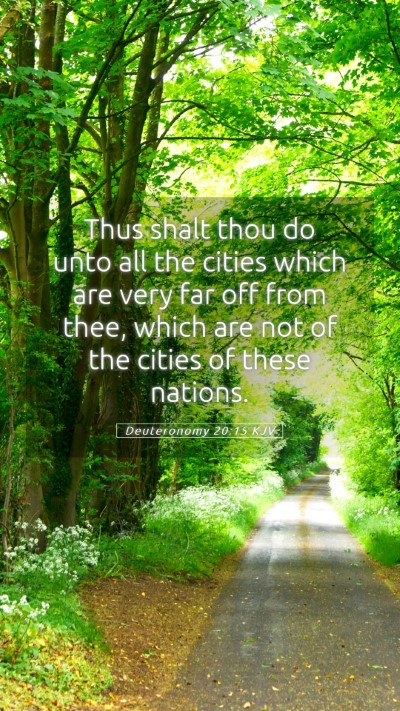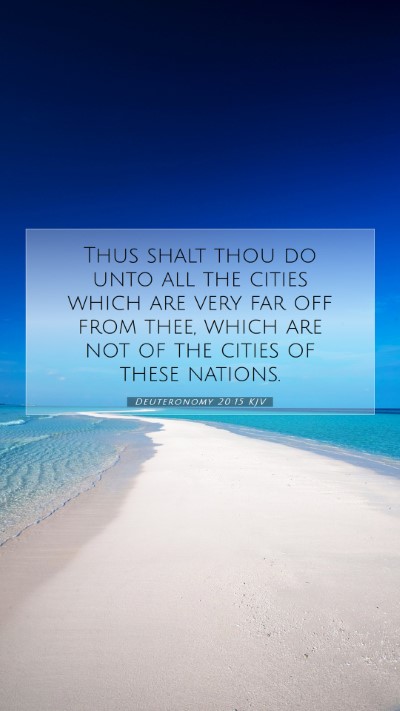Deuteronomy 20:15 - Bible Verse Meaning and Commentary
Deuteronomy 20:15 states:
"Thus shalt thou do unto all the cities which are very far off from thee, which are not of the cities of these nations."
This verse occurs within the broader context of instructions given by Moses to the Israelites regarding warfare and the treatment of conquered peoples.
Understanding the Verse
The verse indicates that the Israelites were to follow specific guidelines when dealing with cities that were not part of the nations directly surrounding them, particularly those far away. This reflects a distinction between cities that might have a different relationship with Israel compared to those that were near.
Bible Verse Interpretations
In interpreting this verse, various commentators offer unique insights:
-
Matthew Henry: He emphasizes the idea that God’s commands were meant to maintain Israel's distinct identity and moral integrity. The treatment of distant cities reflects a measured approach to war, encouraging restraint and adherence to God's laws.
-
Albert Barnes: Barnes interprets this passage in the light of Israel's covenant relationship with God, suggesting that their military actions should not only be about conquest but also about the preservation of their own heritage and values. He notes the unique status of these cities in relation to Israel’s mission.
-
Adam Clarke: Clarke provides historical context, explaining that the cities far off might represent nations that were not immediate threats or those that had not directly opposed Israel. He stresses the idea that the people of God were to act with prudence and wisdom, not merely aggression.
Historical Context
This command is placed within a series of laws regarding warfare in ancient Israel. The Israelites were instructed to follow a different moral code that aimed for righteousness even in conflict, which can be seen as a precursor to later teachings on love and mercy.
Bible Study Insights
This verse offers several critical insights for Bible studies:
- Moral Conduct in Warfare: The instructions in this verse highlight the importance of ethics in military actions.
- God’s Guidance: Emphasizes the need for divine wisdom in decisions, especially in challenging situations.
- Nation Distinction: Reflects God's plan for Israel to be a separate and chosen people.
- Justice and Restraint: Shows that victory does not grant an open license for cruelty and injustice.
Significance and Application
Understanding Deuteronomy 20:15 is relevant for modern readers in various ways:
- It teaches the importance of maintaining moral and ethical standards in any form of conflict.
- It encourages believers to seek God's wisdom when making decisions that impact others.
- It reminds us of the significance of being a distinct people in our values and actions.
Cross References
For a deeper understanding of this verse, consider the following related passages:
- Deuteronomy 7:1: Instructions on dealing with the nations in the land of Canaan.
- Deuteronomy 20:10: Guidelines for engagement in warfare.
- Leviticus 25:23: The land belongs to God and we are merely sojourners.
In conclusion, Deuteronomy 20:15 offers valuable insights into the conduct of God’s people, emphasizing the need for moral integrity, divine guidance, and ethical actions even in warfare. Studying this verse in conjunction with its context provides a clearer understanding of God's intentions for His people.


